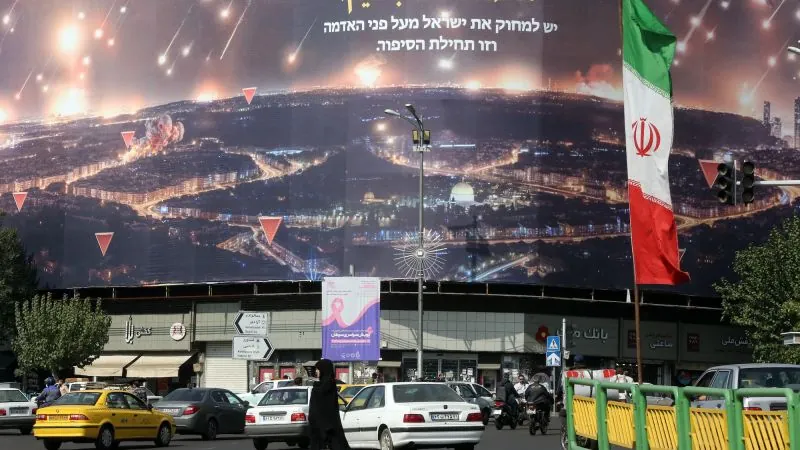
Tensions Escalate: Iran Awaits Israel's Next Move Amid High-Stakes Standoff
2024-10-11
Author: Lok
Introduction
As the geopolitical landscape continues to shift, the Iranian government finds itself on high alert, anxiously engaged in desperate diplomatic outreach throughout the Middle East. The primary goal? To determine whether they can mitigate Israel's potential retaliation following the missile strikes Iran conducted earlier this month. Sources have indicated that Iran's concern is not just about immediate responses but also about securing support that might protect Tehran from future repercussions.
Iran's Response and US Influence
The heightened anxiety in Tehran is exacerbated by the uncertainty surrounding the extent of American influence over Israeli military decisions. US officials have been actively consulting with Israeli counterparts regarding how to manage the fallout from the October 1 missile attacks, emphasizing that they wish to avoid any targeting of Iranian nuclear sites or oil facilities. President Joe Biden's recent conversation with Israeli Prime Minister Benjamin Netanyahu marks their first dialogue in almost two months, wherein Biden advised a "proportional" response to the situation.
Concerns Among Gulf Allies
Meanwhile, Gulf allies of the United States—comprising nations such as the United Arab Emirates, Bahrain, and Qatar—have openly expressed fears regarding the potential targeting of Iranian oil infrastructure. An Arab diplomat relayed concerns that such actions could lead to devastating economic and environmental consequences that would reverberate across the region.
Rising Tensions in Washington
This ongoing cycle of confrontational exchanges, sparked by earlier Israeli strikes, raises alarms in Washington. The Biden administration is particularly anxious that this tit-for-tat dynamic could spiral into a broader regional conflict, potentially drawing the United States into the fray. Notably, the trust between the US and Israel has shown signs of waning over the past year, with Israel increasingly dismissive of calls for restraint, echoing patterns seen during its military operations in Gaza.
Israeli Military Actions and Casualties
Israel's military activities have led to substantial casualties in Lebanon, with over 1,400 reported deaths since late last month. The Israeli government has made significant moves without prior coordination with Washington, conducting a large-scale attack against Hezbollah and assassinating its leader, Hassan Nasrallah, just two days after the US and France proposed a ceasefire plan.
Israel's Security Cabinet and Strategic Deliberations
As of this week, Israel's security cabinet is still deliberating its strategy, fueled by skepticism about transparency in its communications with the US. Current indications suggest that Israel has not assured that it will refrain from pursuing action against Iranian nuclear capabilities, which have been on the Israeli radar for decades. Military simulations of such attacks have been conducted by Israel in the past, and recent cyberattacks attributed to Israel have targeted Iranian facilities, most notably during the infamous Stuxnet incident.
Warnings from Israeli Officials
In a stark warning delivered earlier this week, Israel's Defense Minister Yoav Gallant declared that any forthcoming response would be "powerful, precise, and above all – surprising."
Gulf States' Neutral Position
Amid these turbulent tensions, the Gulf states are keen on maintaining a neutral position, even as Iran issues threats to any nation perceived as aiding Israel. Countries such as Saudi Arabia, the UAE, and Qatar have communicated to the US and Iran that they will not permit their airspace to be utilized for attacks on Iranian territory. Jordan has echoed this sentiment, emphasizing its commitment to safeguarding its airspace.
Iran's Stance and US Backchannels
Despite Iran's aggressive posturing, US officials believe Tehran is wary of engaging in a full-scale war with Israel. Iranian Foreign Minister Abbas Araghchi stated unequivocally that it is Netanyahu who is "the only one who wants a war" to consolidate his power.
Diplomatic Efforts with Saudi Arabia
US backchannels continue to encourage Iran to temper its responses should Israel decide to escalate further. Qatar, acting as a conduit for communications, relays Iran's messages back to Washington, although uncertainty remains about Iran's potential actions going forward. The response will depend greatly on how Israel chooses to act.
Iran's Need for Support
Iran's leaders are particularly keen on gaining support from Saudi Arabia to help manage the crisis, with diplomatic meetings occurring frequently between the two nations. As global attention sharpens on Israel's potential actions, the nation finds itself in a period of reflection as it observes Yom Kippur, which will impose shutdowns across the country, including airports and public transportation.
Conclusion
With the future uncertain, the world awaits Israel's next move with bated breath as the conflict inches toward a critical juncture.



 Brasil (PT)
Brasil (PT)
 Canada (EN)
Canada (EN)
 Chile (ES)
Chile (ES)
 España (ES)
España (ES)
 France (FR)
France (FR)
 Hong Kong (EN)
Hong Kong (EN)
 Italia (IT)
Italia (IT)
 日本 (JA)
日本 (JA)
 Magyarország (HU)
Magyarország (HU)
 Norge (NO)
Norge (NO)
 Polska (PL)
Polska (PL)
 Schweiz (DE)
Schweiz (DE)
 Singapore (EN)
Singapore (EN)
 Sverige (SV)
Sverige (SV)
 Suomi (FI)
Suomi (FI)
 Türkiye (TR)
Türkiye (TR)